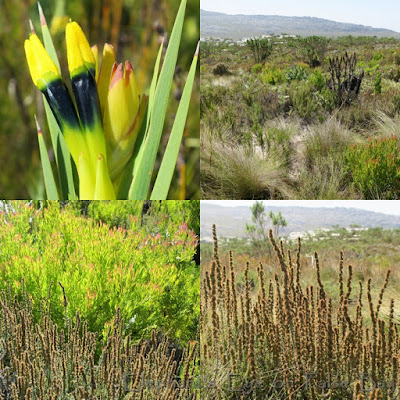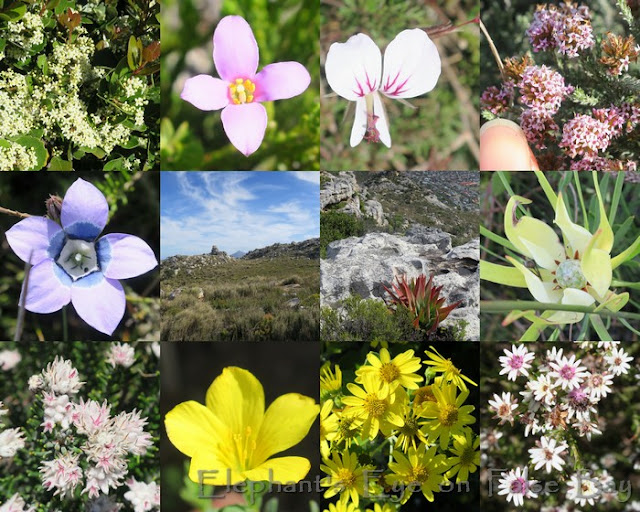Up Cape mountains through April flowers
by Diana Studer
- gardening for biodiversity
in Cape Town, South Africa
Hiking among
wildflowers
and in the mountains
around Cape Town
In April he hiked up Constantiaberg. Look down at Hout Bay,
the fishing harbour, and new roads ripping up the slope for upmarket houses.
Next day we too walked along Steenberg Ridge. As we turned
down to Silvermine dam I looked up to the Constantiaberg mast where he was. Me
up there? You must be joking! Carpenter
bee on Aspalathus capitata. Remember
the black girdled lizard
and snake battle? Usually they bask in the sun, guard their rock.
Disa ferruginea
sharing the colours
of the Jersey lily. Daisy flower bracts on Ursinea paleacea. Tritoniopsis
triticea is a more common 'red spike'. Gladiolus
brevifolius where I admire the varied markings on the lip.
Furry red Erica cerinthoides.
Radiating Erica ericoides smells of
honey. Erica plukenetii has dangly
bits and long leaves. Erica hirtiflora
with small furry pink balls.
Erica lutea in
cream is tiered. Leucadendron xanthoconus
young male flowers in silvery red. Leucadendron
spessifolia in chunky red. Diosma
oppositifolia a fragrant buchu.
Struthiola ciliata
with tiny golden crowns. Softly mauve Pseudoselago
serrata. Feathery Phylica imberbis. Blue
daisy (NOT Felicia) Zyrphelis taxifolia with needle leaves
in damp places.
If there's a cave ... he is in. This one at Grotto Ravine.
Beetling in apple green Protea
coronata at Silvermine towards Noordhoek. Protea cynaroides bud. Erica
multumbellifera (in white not the usual deep pink)
Perfect globes of pink Brunia
abrotanoides and ivory Brunia noduliflora.
Silver grey leaves Gnidia imbricata. Strawberry
buds of Anaxeton laeve dance across
the landscape.
Yellow daisies Athanasia
crithmifolia (named
for samphire) and Euryops
abrotanoides. Oxalis polyphylla showing its feathery leaves. Feathered
antlers on Bulbine favosa.
Detoured for Witsenia maura bokmakierie's tail, a
woody iris standing 1-3 metres high. Stoebe
cinerea with Leucadendron.
Fynbos is fire adapted but deep in the kloofs along tumbling
mountain streams trees survive to grow old. Halleria
lucida in Woody Ravine.
At Elsie's Peak Zygophyllum
spinosum up then down. Reddish Erica coccinea
also dangly bits but short leaves. Pink bells of Erica pulchella. Erica viscaria has large pink flowers. Erica nudiflora with flowers that lean
to one side (exposing a bared stalk)
Cassine peragua
covered in white flowers. Lachnaea
grandiflora (which is small!) Delicate Pelargonium
myrrifolium. Little Stoebe capitata
in pink.
Blue banded Roella
ciliata. Mountain aloe on Elsie's Peak Aloe
succotrina. Ivory female Leucadendron xanthoconus
Pink stars on Trichocephalus
stipularis. Yellow bell of Linum
africanum. Yellow daisy Osteospermum
moniliferum (my tapestry hedge on the verge). Staavia radiata with deep pink hearts
I once bought Jurg a birthday King protea in Zurich - from a
chic florist. Now he has the real live Protea
cynaroides on St James' Peak!
Tiny pink hibiscus Anisodontea
scabrosa. At Gifkommetjie - Tylecodon grandiflorus is also poisonous
for stock farmers. Bronze Manulea
tomentosa. Lichen.
Olea capensis
ironwood smothered in white. Eriocephalus
africanus wild rosemary white sparked with yellow and pink hearts. Chaenostoma hispidum (was Sutera). Mauve Muraltia heisteria (beware of pointy bits!)
Cullumia setosa
with teeth. Yellow daisy Othonna
arborescens (tree delusions) this one with toothed leaves. White Erica capensis. Pink Erica abietina flowers splay out
Red berries on Maurocenia
frangula. Autumn star Empodium
plicatum. Tiniest protea Diastella
divaricata. Even tinier squash Kedrostis
nana.
I fell in love with Serruria
villosa - and now have a thumbsized plant from Kirstenbosch Plant Fair! Big
white daisy with burgundy buds Arctotis
aspera. Cabbage tree has the weirdest flowers Cussonia thyrsiflora.
I hike
with U3A each week.
I invite you to join us at Elephant's Eye on False Bay.
Please subscribe as you prefer
via Feedly,
or Bloglovin,
Teal blue text is my links.
To read comments if you are in email or a Reader,
first click
thru to the blog)
Thanks for comments that add value. Maybe start a new thread
of discussion? BTW your comment won't appear until I've read it. No Google
account? Just use Anonymous, but do leave a link to your own blog. I would
return the visit, if I could...
I welcome comments on posts from the last 2 months.













The incredible range of flowers in your part of the world never ceases to amaze me, Diana. Seeing all those pretty Ericas has me wondering once again why I've never tried to grow any (among the few varieties available here). I adore the Diastella divaricata, yet another plant I've never seen before but now will covet, although I very much doubt it'll ever make it into the US nursery trade.
ReplyDeleteThank you for always sharing the rich diversity and beauty of the area so freely. Always informative and beautifully captures the magnificence that surrounds us.
ReplyDeleteWhat a view from that height! I am always in awe of the array of plants you have growing in your area and I’m glad you were able to find the one you like so you will now have it in your beautiful gardens! I think I would not want to venture in the caves lol, no correction, I know I would not go in the caves lol
ReplyDeleteYou have some fascinating places to hike, and as always, stunning wildflowers! I'm jealous of your hills and mountains...and the views!
ReplyDeleteThank you for amazing me yet again. Brunia! Roella! Mountains, with the ocean beyond!
ReplyDeleteI hope to see these beauties in person someday!
ReplyDeleteIf you do come to Cape Town, it would be wonderful to see our flowers thru your Tennessee eyes.
Deleteit's incredible that you have all these amazing flowers in the beginning of your autumn, this could be Spring in Europe.<3
ReplyDeleteSo lovely, Diana, to see your blogpost today. I have just reread one of my posts, which you commented under, a poem about longing for South Africa 'home'. Gorgeous to see your pics. X
ReplyDeleteThere is just a huge range of plants and flowers. How wonderful to be able to climb and walk amongst them. I like your comment: if there is a cave he is in it! What would you hubby say about you in this vein?
ReplyDeleteSO slow, all those flower pictures, never get anywhere.
DeleteYour carpenter bee looks nothing like the carpenter bees around here. So interesting.
ReplyDeleteJeannie@GetMeToTheCountry
A 1-3 metre high iris? Wow, unbelievable! Next time you should take a selfie with this incredibly tall iris.
ReplyDeleteI hadn't thought of a picture with hikers for scale
DeleteThe cabbage tree flower really is weird-looking. Do you know what kind of co-evolution or adaptation has made that shape functional?
ReplyDeleteThe newer PZA articles include pollinators - but this one is unfortunately not updated.
Deletehttp://pza.sanbi.org/cussonia-thyrsiflora
Pollinated by sunbirds who like a sturdy perch.